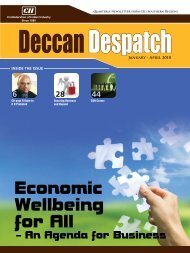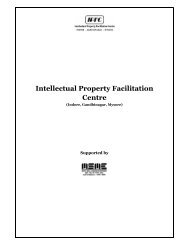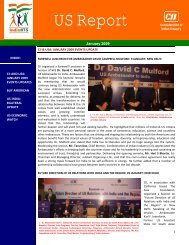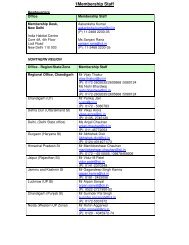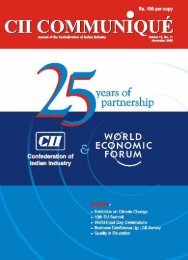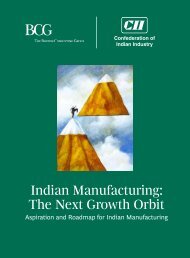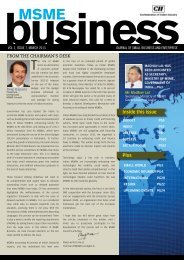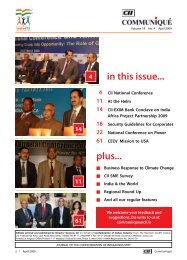CII Communique - December, 2010
CII Communique - December, 2010
CII Communique - December, 2010
You also want an ePaper? Increase the reach of your titles
YUMPU automatically turns print PDFs into web optimized ePapers that Google loves.
leadership<br />
Inventory Management & Supply Chain<br />
Money is tied up in every stage, starting from the<br />
management of suppliers delivering raw materials, to<br />
goods in various levels of completion in the production<br />
process as well as management and delivery of finished<br />
goods in the distribution channel. Inventory and supply<br />
chain optimization thus becomes imperative for any<br />
organization as it can make or mar businesses.<br />
A workshop on ‘Inventory Management and Supply<br />
Chain Optimization’ was organized on 18-19 November<br />
with the focus on understanding the methodologies<br />
and practices to improve inventory processes, improve<br />
customer service, reduce inventory investment and<br />
increase productivity. It also deliberated upon the<br />
analysis and improvement of inventory performance<br />
and the use of modeling of Inventory System Changes<br />
before Change Implementation.<br />
Workshop on Direct Taxes Code<br />
The revised Direct Tax Code Bill, which would replace the<br />
current Income Tax Act of 1961 and the Wealth Tax Act<br />
of 1957 is proposed to be effected from 1 April 2012 if<br />
enacted. It will be an important milestone in the history<br />
of the Indian Taxation System, and is certain to alter the<br />
tenets of the game particularly the way businesses are<br />
structured. It will also address the existing complexity<br />
in the Direct Tax System. An understanding of the Code<br />
will help companies plan the impact of direct taxes on<br />
their businesses.<br />
The workshop on ‘Direct Taxes Code’ on 23 November<br />
deliberated on the proposed provisions of the DTC,<br />
the tax incentives and transition provisions for better<br />
planning of impact on future incomes, International<br />
tax issues and also Transfer Pricing issues, which will<br />
be required to achieve operational efficiencies. The<br />
workshop also helped to understand the Personal Tax<br />
scenario under the DTC, to plan forward and also for<br />
employers to remain compliant with the new withholding<br />
tax provisions on salaries. Understanding submission<br />
of returns, payment of taxes and assessments under<br />
DTC was also covered.<br />
Goods and Service Tax<br />
The Goods and Service Tax, proposed to be introduced<br />
in India from 1 April 2011, would replace a host of current<br />
regulations under the Indirect Taxes regime and is an<br />
attempt to simplify understanding and implementation,<br />
with resultant compliance. It is a step towards unification<br />
of all existing taxes which are applicable on production<br />
and consumption of goods and services, in order to<br />
remove the cascading effect on tax.<br />
A workshop on ‘Goods & Services Tax’ organized on 24<br />
November provided a comprehensive understanding of<br />
the new indirect taxation structure to enable redesigning<br />
the logistics requirements in manufacturing, supply<br />
and distribution of goods and services. The workshop<br />
helped understand the Goods and Service Tax vis-à-vis<br />
the current Indirect Tax regime, the transition provisions<br />
for better planning of impact on businesses especially<br />
of impact on supply chain costs and procedures. The<br />
workshop also increased awareness on complications<br />
relating to registration, threshold limits, interstate transfer<br />
of goods and services and treatment of exemption/<br />
incentives.<br />
36 | <strong>December</strong> <strong>2010</strong> Communiqué



